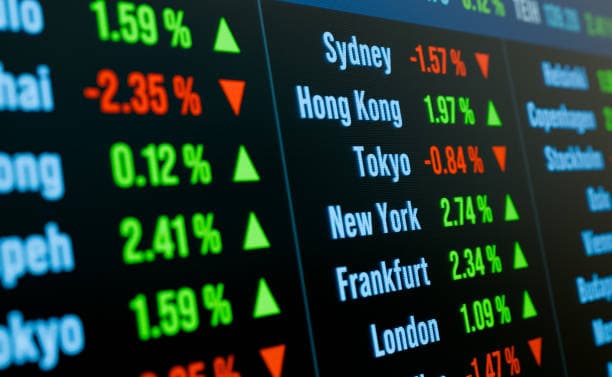The online stock market has become a bustling hub for investors, traders, and enthusiasts alike. Ethical considerations in this realm are not just a matter of doing the right thing, they are crucial for maintaining the integrity of the financial ecosystem. In the grand scheme of Global Markets, ethical trading practices are the cornerstone of a stable and prosperous economic future. This article delves into the ethical landscape of modern online stock market trading, specifically within the context of Forex, and explores the implications for all stakeholders involved.
The Ethical Framework of Online Trading
In the vast expanse of Global Markets, ethical considerations are paramount. Trading online, particularly in Forex, involves a complex web of relationships between brokers, traders, and the markets themselves. The ethical framework that governs these interactions is built on principles of transparency, fairness, and responsibility. Transparency ensures that all parties have access to the same information, which is essential for making informed decisions. Fairness demands that the playing field is level, and no single entity has an undue advantage. Responsibility requires that each participant acts in the best interest of the market as a whole, rather than solely pursuing personal gain.
The Role of Regulation in Ethical Trading
Regulation plays a pivotal role in upholding ethical standards in online stock market trading. In the realm of Forex, regulatory bodies like the Financial Conduct Authority (FCA) and the Commodity Futures Trading Commission (CFTC) set the rules that brokers must follow. These rules are designed to protect investors and maintain the integrity of the market. They cover everything from capital requirements for brokers to disclosure of risks and conflicts of interest. By adhering to these regulations, brokers demonstrate their commitment to ethical trading practices and contribute to a more trustworthy Global Markets environment.
The Impact of Technology on Ethical Trading
Technology has revolutionized the way we trade, making it faster, more efficient, and more accessible than ever before. However, it has also introduced new ethical challenges. High-frequency trading, for example, has been criticized for creating an uneven playing field, where large institutions with sophisticated algorithms can outmaneuver smaller players. To address this, some exchanges have implemented speed bumps to slow down trading and level the playing field. Additionally, the rise of social trading platforms (In Arabic, it is called “منصة تداول“) has raised questions about the responsibility of influencers who share trading advice. These platforms must ensure that their users are aware of the risks involved and that the advice given is based on sound, ethical principles.
The Importance of Education in Ethical Trading
Education is a critical component of ethical trading. Traders must understand the implications of their actions and the potential consequences for the Global Markets. This includes understanding the basics of supply and demand, the impact of economic indicators on currency values, and the role of geopolitical events in shaping market trends. By fostering a culture of continuous learning, brokers can help traders make more informed decisions and contribute to a more ethical trading environment. Forex education, in particular, is essential for traders to navigate the complexities of currency markets and to understand the ethical considerations inherent in these transactions.
The Role of Brokers in Promoting Ethical Trading
Brokers have a unique responsibility in promoting ethical trading practices. They are the intermediaries between traders and the markets, and their actions can significantly influence the behavior of their clients. By offering transparent pricing, clear communication, and robust risk management tools, brokers can encourage responsible trading behavior. They must also be vigilant in identifying and preventing fraudulent activities, such as money laundering and insider trading. By taking a proactive stance on ethical issues, brokers can help to foster a culture of integrity within the Global Markets and contribute to the long-term stability of Forex trading.
The Ethical Dilemmas Faced by Traders
Traders themselves face a myriad of ethical dilemmas in their day-to-day activities. From deciding whether to use leverage to how to respond to market manipulation, each decision carries ethical weight. Traders must balance the pursuit of profit with the need to act responsibly and ethically. This includes being aware of the social and environmental impact of their investments and considering the broader implications of their trading activities on the Global Markets. By making ethical choices, traders can contribute to a more sustainable and equitable financial system.
The Future of Ethical Trading in Global Markets
As technology continues to evolve and the Global Markets become increasingly interconnected, the ethical considerations in online stock market trading will only become more complex. The future will likely see a greater emphasis on ethical AI and machine learning algorithms, which can help to detect and prevent unethical practices. Additionally, there will be a growing demand for brokers to demonstrate their commitment to sustainability and social responsibility. By embracing these changes and continuing to prioritize ethical considerations, the Global Markets and Forex (In Arabic, it is called “فوركس“) can move towards a more just and equitable future.
In conclusion, ethical considerations in modern online stock market trading are not just about following the rules, they are about building a financial system that is fair, transparent, and sustainable. By understanding and embracing these principles, traders, brokers, and regulators can work together to create a Global Markets environment that benefits all participants and contributes to the overall health and stability of the world’s financial systems.

